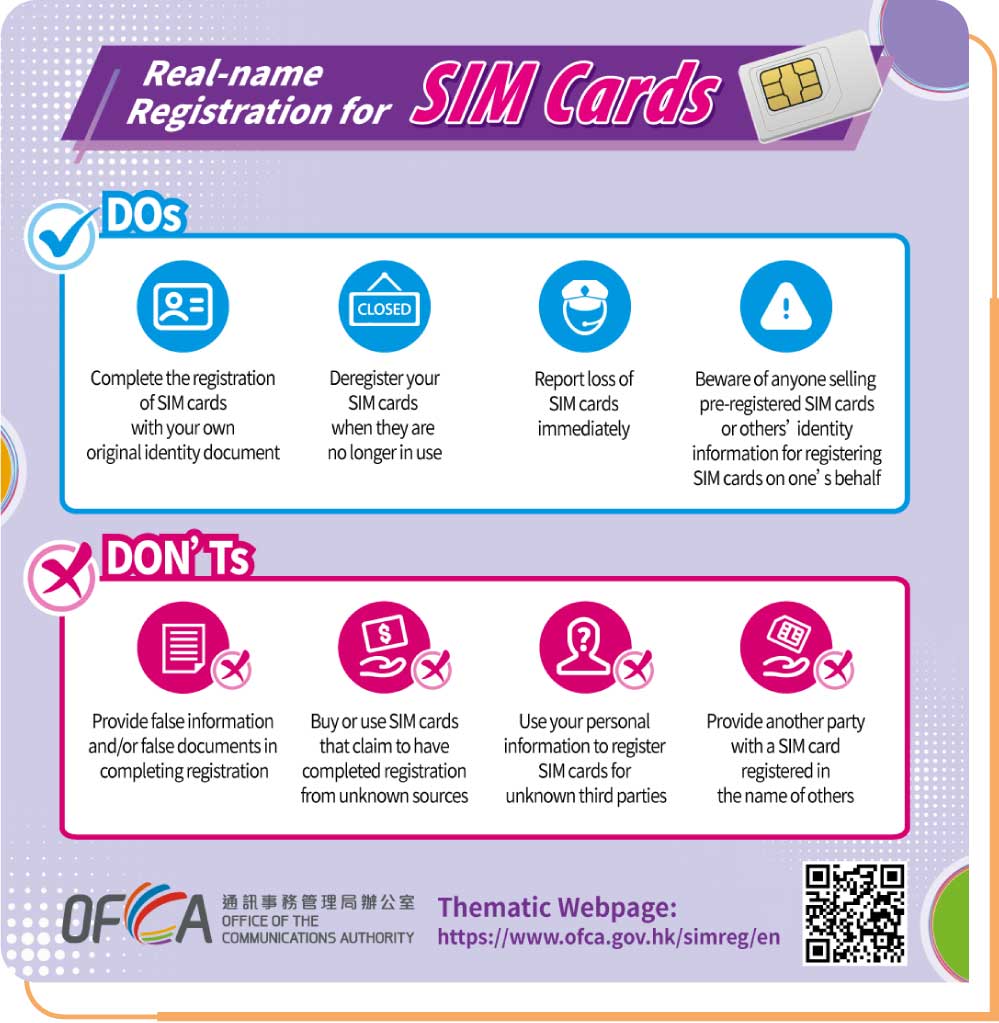The Competition Ordinance (Cap. 619) (CO) provides a cross-sectoral competition law prohibiting anti-competitive conduct in all sectors. Under the CO, CA is conferred concurrent jurisdiction with the Competition Commission to enforce the CO in respect of the conduct of undertakings operating in the telecommunications and broadcasting sectors, including merger and acquisition activities involving carrier licensees in the telecommunications sector.
Pursuant to the memorandum of understanding signed by CA and the Competition Commission, CA will ordinarily assume the role of the lead authority for matters falling within the concurrent jurisdiction. For matters involving issues that are partly within and partly outside the concurrent jurisdiction, CA and the Competition Commission will discuss and agree on the best arrangement in handling the matter on a case-by-case basis.

From 1 April 2023 to 31 March 2024, a total of 22 complaints and enquiries were received under the CO, out of which 18 cases were closed without the need for further action and four cases are being processed.
During the year, OFCA also assisted CA in reviewing two transactions under the merger rule of the CO, and no further action was considered necessary after the review.
The fair trading sections of the Trade Descriptions Ordinance (Cap. 362) (TDO) prohibit certain specified unfair trade practices by traders in the provision of goods and services to consumers.
CA is conferred concurrent jurisdiction with the Customs and Excise Department to enforce the fair trading sections of the TDO regarding the commercial practices of licensees under the TO and the Broadcasting Ordinance (Cap. 562) directly connected with the provision of telecommunications and broadcasting services. The two enforcement agencies have entered into a memorandum of understanding to coordinate the performance of their functions under the fair trading sections of the TDO and have issued a set of enforcement guidelines to provide guidance for traders and consumers regarding the operation of the fair trading sections.
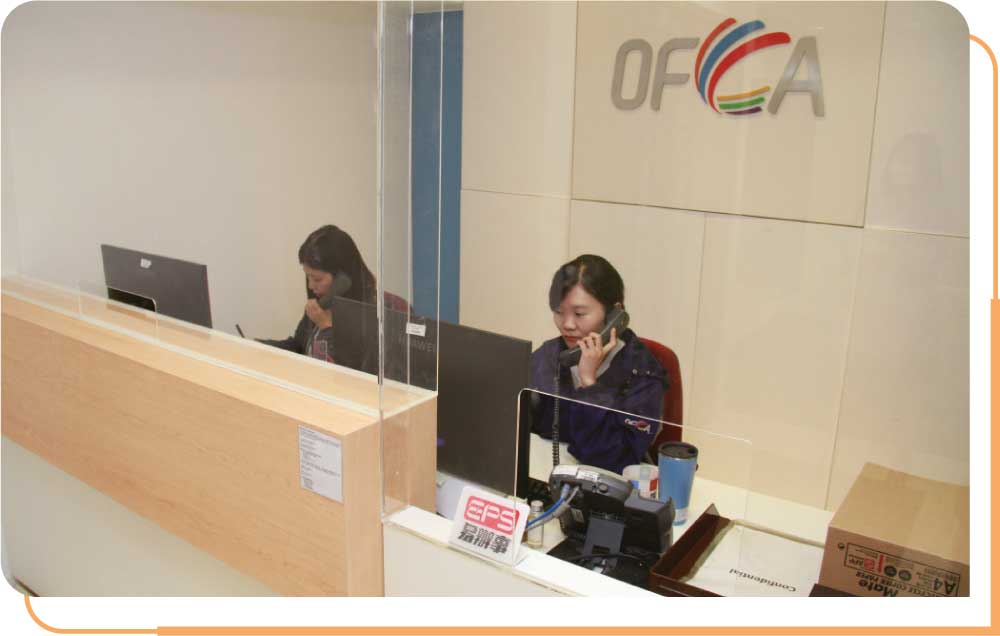
OFCA staff members handling public enquiries related to broadcasting and telecommunications matters through the hotline.
From 1 April 2023 to 31 March 2024, OFCA handled a total of 305 complaint cases under the TDO, 259 of them were closed due to insufficient evidence to establish the occurrence of a contravention or because they fell outside the scope of the TDO. Seven cases (including one successful prosecution case against a salesperson who was convicted by the court in October 2023) were closed after CA issued advisory letters to the licensees concerned to bring the subject matter to their attention with advice for improving their relevant commercial practices in relation to the sale, supply or promotion of telecommunications or broadcasting services to consumers. The remaining 39 cases were under processing.
CA has established three Do-Not-Call (DNC) Registers, for facsimile messages, short messages and pre-recorded telephone messages respectively under the Unsolicited Electronic Messages Ordinance (Cap. 593) (UEMO). No commercial electronic messages (CEMs) shall be sent to registered telephone numbers unless the senders have obtained consent from the registered users. As of end March 2024, these DNC Registers contained more than 2.8 million telephone numbers. Apart from not sending CEMs to the registered telephone numbers on the DNC Registers, senders of CEMs are also required under the UEMO to comply with a number of rules. For example, they must provide the recipients with their contact information and an “unsubscribe facility” in their CEMs so that the recipients can contact the senders and unsubscribe from receiving their CEMs.

In 2023/24, OFCA received 688 reports regarding suspected contraventions of the UEMO, an increase of about 27% from the previous year. A majority of these reports were related to pre-recorded telephone messages and short messages. OFCA will continue to monitor the compliance situation and streamline the procedures for more effective enforcement.
OFCA will take enforcement actions on cases suspected of contravening the UEMO. Generally speaking, for cases where the number of reports received against a sender is below a certain threshold, OFCA will issue an advisory letter reminding the sender to observe the requirements under the UEMO. In cases where the number of reports received against a sender exceeds the threshold, or if OFCA continues to receive reports against the same sender after the issuance of advisory letter, OFCA will conduct formal investigation and may issue warning letter to the sender. In 2023/24, a total of 48 advisory letters and six warning letters were issued. Cases where senders of CEMs who have rectified their breaches after receiving advisory letters or warning letters will not be proceeded for further enforcement actions like enforcement notices issued to the senders of CEMs.
In the event of repeated contraventions by a sender of CEMs, CA may issue an enforcement notice in accordance with section 38 of the UEMO directing the sender to take steps to remedy the contravention. Anyone who fails to comply with an enforcement notice may be liable to a fine of up to HK$100,000 on the first conviction.
To safeguard consumer interests in the use of telecommunications services, OFCA takes proactive actions to implement various consumer protection measures and works with the industry to draw up and implement self-regulatory measures for addressing new consumer issues that may arise from time to time.
These measures include the voluntary Customer Complaint Settlement Scheme (CCSS) administered by the Communications Association of Hong Kong representing the industry. The CCSS aims to help resolve billing disputes in deadlock between telecommunications service providers and their customers through mediation.
Other self-regulatory measures voluntarily implemented by the industry include the promulgation of the Code of Practice for Telecommunications Service Contracts to improve the clarity of provisions in the telecommunications service contracts as well as the Code for the Provision of Chargeable Mobile Content Services to govern the practices of third-party content service providers.
Other examples include implementation of mobile bill shock preventive measures as well as publication on OFCA’s website details of the arrangements adopted by major residential broadband service providers to handle service termination requests from consumers.
OFCA will continue to monitor the implementation and effectiveness of the various consumer protection measures adopted and, where necessary, engage the industry to seek further improvement of the existing measures or introduce new measures.
Since December 2010, OFCA has been providing a broadband performance test system which enables broadband service users to measure the performance of their broadband connections, including download and upload speeds, network latency, packet loss and jitter. Apart from users of desktop and notebook computers, users of smart phones and tablets running iOS and Android operating systems may also make use of the test system.
OFCA reviews and upgrades the test system from time to time to enhance its capability and performance. Currently, it supports speed tests of up to 10 Gbps for desktop and notebook computers and up to 5 Gbps for iOS-based and Android-based mobile devices. From service launch to March 2024, more than 124 million broadband performance tests were conducted with the use of the system.
In view of the rising trend of telephone scams, OFCA conducted an array of consumer education programmes and activities during the year to enhance publicity and increase public awareness against telephone scams. Under the theme “Use Communications Services Smartly. Stay Vigilant against Telephone Scams”, different publicity activities, including roving exhibitions, public seminars, mini exhibitions, and community and school talks, as well as roving drama performances for schools, were held to remind the public to stay vigilant of possible telephone scams.
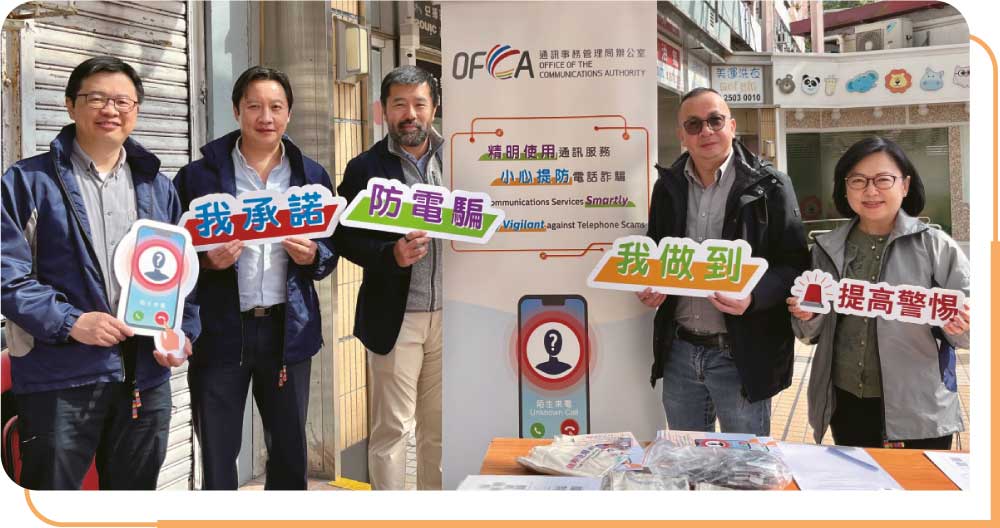

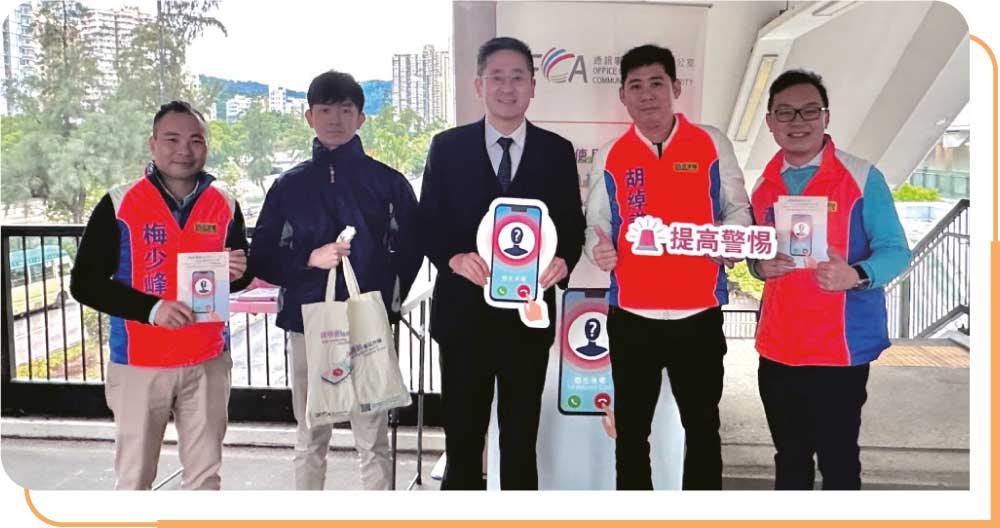


OFCA conducted a series of roadshows in collaboration with CEDB, various political parties, LegCo Members and District Council Members to promote anti-phone scam messages in 18 districts in the first half of 2024.
In addition, OFCA produced two new sets of television and radio announcements in the public interest (APIs), namely the SMS Sender Registration Scheme and the Stay Alert and Beware of Phone Scam Tricks, which were launched in February 2024 and April 2024 respectively. The first set of APIs on the SMS Sender Registration Scheme aims to publicise the features of the scheme i.e. using sender IDs with the prefix “#” to send SMS messages to help the public verify the authenticity of SMS senders, while the second set of APIs is to remind the public to stay alert to various scam tricks and encourage them to use call-filtering services and apps to help filter suspected scam calls. In addition, a promotion truck tour campaign under the theme “My Promise Against Phone Scams”, featuring games and exhibits, was also carried out by visiting different locations in all 18 districts of Hong Kong in December 2023. Started from January 2024, a series of roadshows were arranged in different districts in collaboration with CEDB, various political parties, LegCo Members and District Council Members to promote anti-phone scam messages through the distribution of leaflets and souvenirs to members of the public. OFCA had also offered assistance to members of the public who would like to install relevant call-filtering apps.
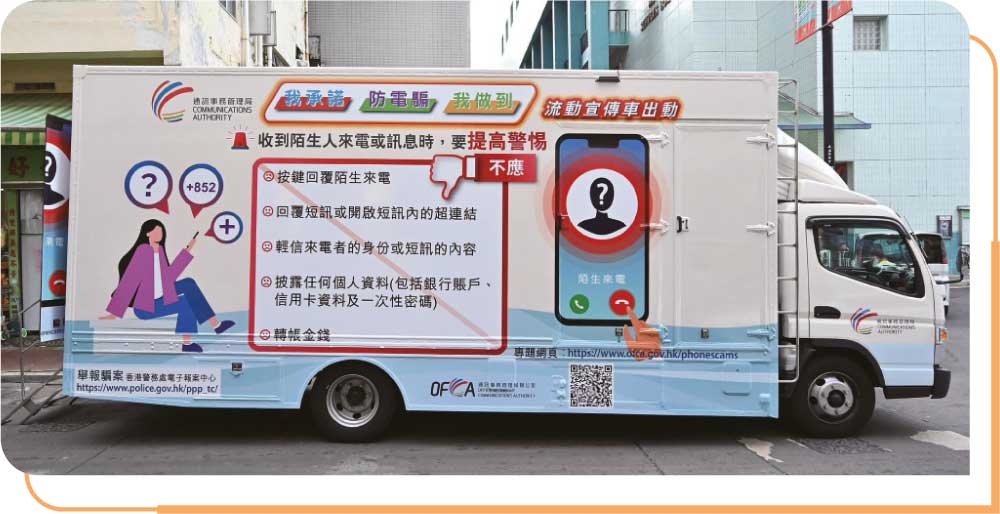
A promotion truck tour campaign themed “My Promise Against Phone Scams” was launched in December 2023 to promote anti-phone scam messages.
Following an internal design competition, OFCA launched its mascot named “CommBo” in March 2024. Imbued with broadcasting and telecommunications symbols, the design of CommBo reflects the regulatory role of OFCA in both the broadcasting and telecommunications sectors. The mascot made its debut at a roving exhibition cum launching ceremony officiated by the Director-General of Communications on 9 March 2024. As OFCA’s spokesperson and ambassador, CommBo will continue to appear in different publicity activities and social media platforms of OFCA to help convey to the public information about CA and OFCA, as well as different messages in relation to the smart use of communications services.
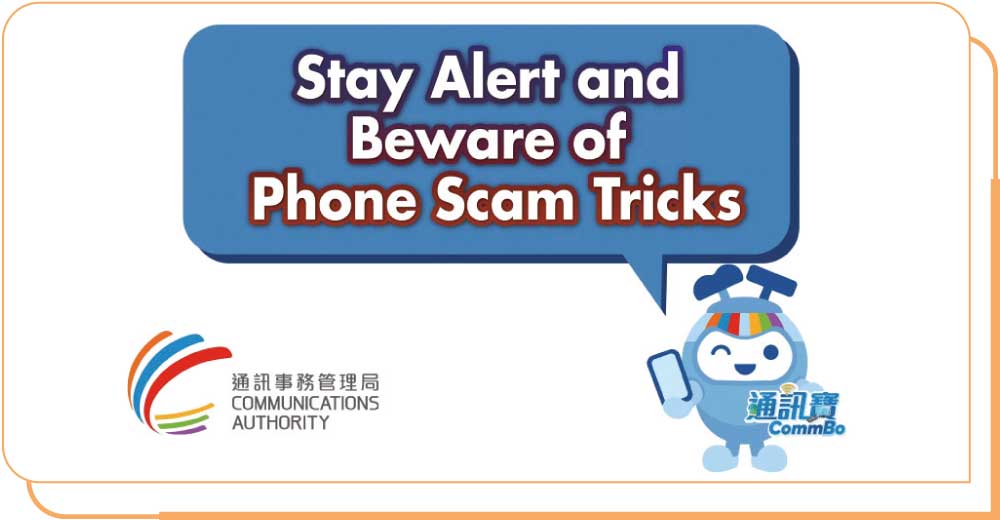

OFCA staff members attended the launching ceremony of OFCA’s mascot “CommBo”.
To promote the Labelling Scheme for Buildings with 5G Indoor Coverage, a new set of APIs was launched in May 2024 with the aim of encouraging owners or managers of indoor places equipped with 5G to display the new “Label for Buildings with 5G Indoor Coverage” produced by OFCA. Labels specially designed for the scheme were produced for distribution to MNOs for display at places installed with 5G mobile communications facilities.
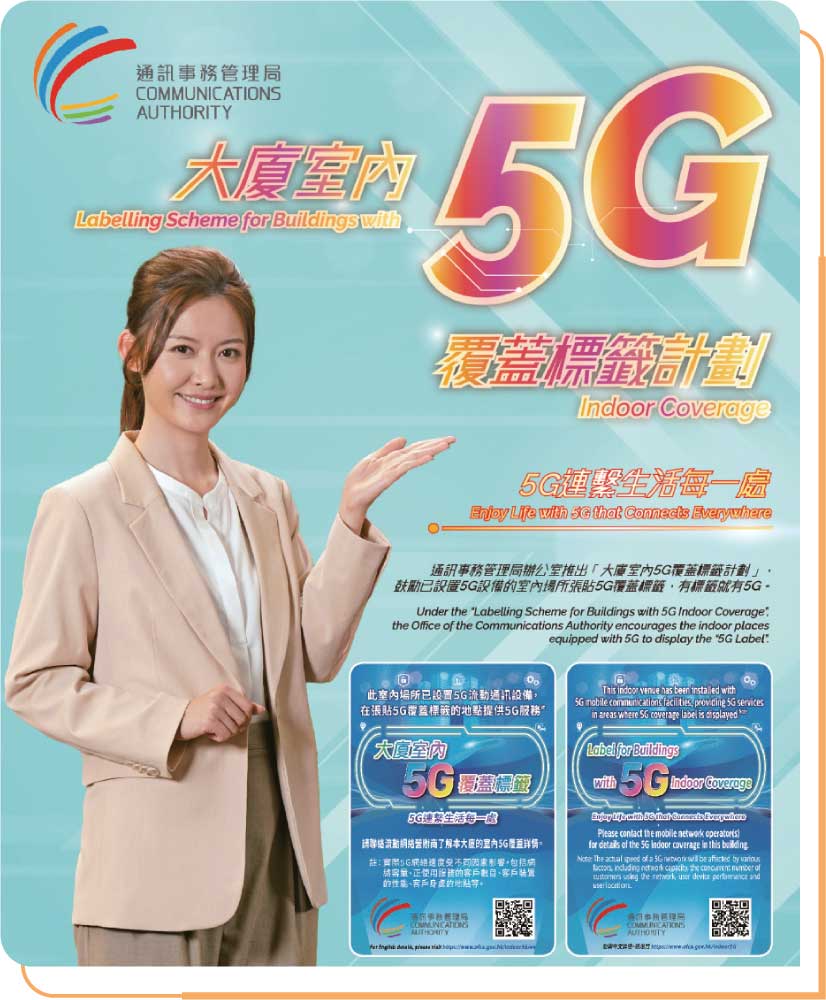
Following the full implementation of the RNR Programme in February 2023, OFCA continues to carry out publicity to remind the public to complete SIM card registration with their own original identity documents through a thematic webpage, distribution of information leaflets, and publication of infographics, social media posts, etc. Other messages also include reminding the public to deregister SIM cards which are no longer in use, to report loss of SIM cards immediately and not to purchase “registered” pre-paid SIM cards from unknown sources in the market.
